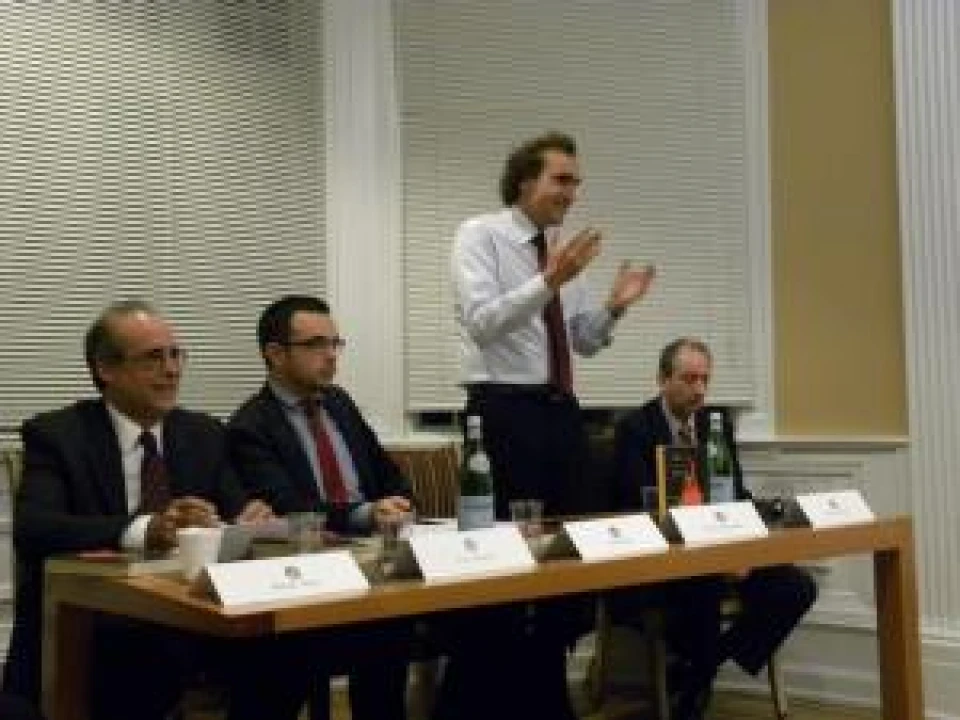US-Italian differences over the Milan kidnapping and "extraordinary rendition" of Egyptian terrorism suspect Abu Omar in 2003, and the subsequent conviction in Italian court of 22 CIA operatives (in absentia), should not obscure the fact that the US and Italy have a long history of cooperation against international security threats, from organized crime to terrorism. It was the Forum's pleasure to participate in organizing an event December 4 on Islamic fundamentalist terrorism in Europe. (The National Italian American Foundation, which provided a wonderful venue, and Italians in DC did the heavy lifting, though.)
The keynote speaker was Stefano Dambruoso, a veteran Italian magistrate with an impressive track record in prosecuting organized crime and terrorism cases, and who was among the first anywhere to recognize and warn of the Al Qaeda threat. Dambruoso presented his recent book Un istante prima (A second before), which he co-wrote with Italian journalist Vincenzo Spagnolo, where he describes how Islamic fundamentalist terrorism has changed in the 10 years after 9/11, putting down roots in Europe. The book draws on Dambruoso's experience as a prosecutor, at the United Nations, and as head of the international relations office at the Italian Ministry of Justice, addressing the situation in Italy and in many other countries as well. Dambruoso gives his compelling story a sense of unity by winding back repeatedly to the story of Muhammad Game, a Libyan living in Milan, a seemingly successful case of integration, living with an Italian woman, children, a good enough job, a house. Suddenly he looses his job. He cannot afford the life he had anymore and he spirals into despair. Through friends he starts attending meetings at the local mosque, but the preaching does not satisfy his rage, his need for action, and he manages to get a computer and an Internet connection and start getting in touch via web with more radical fundamentalist ideologies. On October 12, 2009 Mohammed Game attacked an Italian Army barracks in Milan with an improvised explosive device similar to the ones used in the London underground attack. He survived, though severely injured, and Italy narrowly avoided its own little 9/11. Written in an effective style, appropriate for the broad reading public, Dambruoso's book usefully puts a face, or a series of faces, on Islamic fundamentalist terrorism. It also explains in detailed yet accessible style the laws and law enforcement tools required to combat terrorism effectively. As Dambruoso writes in his book, the peace of "our society needs watchdogs, ready to sniff out the risk, to bark and even to bite anyone who is about to break" the peace.
In addition of Dambruoso's forceful and compelling presentation of the arguments in his book, we were privileged to have on our panel Guido Olimpio, the Washington correspondent for leading Italian daily Corriere della Sera, who has written extensively on terrorism. Olimpio stressed how the Arab Spring has in some ways made the lives of Islamic fundamentalists easier. Daniele Moro, visiting scholar at the John Hopkins School of Advanced International and a leader of the US-Italy Global Affairs Forum, who has been studying the Maghreb situation closely, noted that transition to democracy in the region was a complex process, and the final results, and the impact on Europe, remain unclear. I focused on Dambruoso's book, underlining how it will help the public better understand the complex and important phenomenon of Islamist terrorism. The standing room only crowd was very engaged, asked lots of good questions, and continued the conversation informally after the "official" end of the event.
Eric Terzuolo



